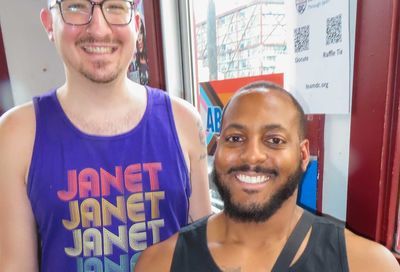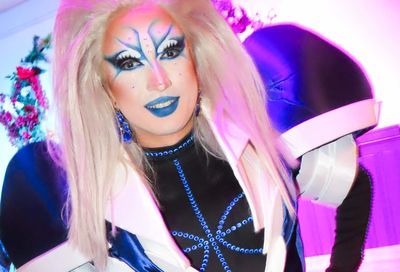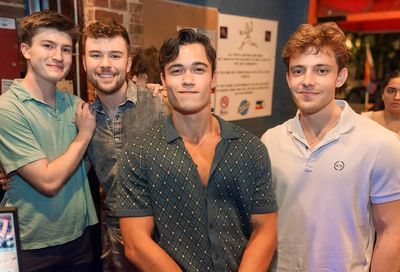Reason for the Season
Alphabet Soup
In a low-income housing complex in Syracuse, a family that looks like George Bush’s definition of family is struggling to make ends meet. This family consists of a husband and a wife and three children.
They are pursuing what George Bush and others might call the American Dream — they are Cuban immigrants who’ve been in the United States for just a few months, working hard because they believed they’d have a better life here. They’re about to have their first American Christmas, and chances are it’ll be snowy and cold, like in the storybooks.
While George Bush celebrates Saddam Hussein’s capture, this family is dealing with the way their oldest son, 10-year-old Gabriel, reacts to life in a small apartment. He suffers from a condition that makes it hard for him to stay calm, so he reacts and over-reacts to the sights and sounds around him — like strangers knocking at his door at all hours, asking his parents if they want to buy this or that stolen property. Some of the people there see his parents as prey; they are poor, they cannot speak English, and they are perhaps an easy target.
Gabriel and his 2-year-old twin brothers are here with their parents because of two extremely lucky turns. His parents, Yannet (pronounced like Jannette) and Alfred, applied for something called the Diversity Visa Lottery in Cuba — a program where people who want to live in the United States send in an application and hope for their name to be drawn. Yannet and Alfred won the first time they tried — which is fortunate, because as my new friend José puts it, everyone in Cuba applies for the visa lottery.
When José visited them recently, he was up late talking with the adults when there was a knock at the door. It was after midnight, so José became suspicious. But Alfred went right to the door and opened it, because in Cuba, José explains, people share what they have. It’s “an open-door policy” there, he says. Alfred thought he had no reason to fear or mistrust anyone who knocked on his door.
The woman who knocked started talking to Alfred, trying to sell something. When José asked what was going on, she realized that there was an English speaker in the apartment, and she quickly said she’d made a mistake and left. José never found out what she was trying to get away with that night.
José is Yannet’s cousin. He’s a gay man who lives in Washington and immigrated from Cuba eight years ago, after spending 13 months in custody at Guantanamo Bay when he was caught trying to sneak into the United States with 22 other people in a small boat. While he was in custody, his best friend, Jacqueline, sent him a care package each month with books, magazines, clothes, cereal — things to help him get by but also to remember that he had support outside the military base prison, and that he’d have a life on the other side.
Jacqueline — herself a Cuban immigrant — and her partner, Charlotte, live in New York; to hear José describe them, they are one of those lesbian power couples, one of them successful in her public relations career, the other on the staff of a huge weekly magazine. Because of the level of their compassion and commitment to helping others who, like Jacqueline, hope to get out of Cuba, Yannet and Alfred were able to come to the United States and give their children a chance at living outside a Communist regime that, by most accounts, isn’t really working so well.
Winning the Diversity Visa Lottery didn’t answer all of Yannet and Alfred’s prayers. As it turns out, the process of moving to the United States, once you get the government’s blessing, requires payment of around $9,000 — in U.S. funds. Yannet and Alfred did not have resources like that, and although their extended family did everything they could to help, they still came up short.
Enter the power lesbians. Jacqueline and Charlotte wrote an appeal letter to all of their friends, relatives, acquaintances, business associates — anyone they knew who might help. Before long, they had raised enough money for Yannet and Alfred to make the trip, and the family received word that they were eligible for housing in Syracuse.
As it turned out, getting here was only half the battle. In Cuba, Alfred had enjoyed a successful career as a special effects expert for the national television station. In the United States, the language barrier became a problem, and he considers himself lucky to have found employment working on a factory line during his first few months here. He and Yannet are in language school, making the best of a difficult situation.
On the surface, Yannet and Alfred may represent George Bush’s Republican ideals — arrive in this country legally, take the job you’re offered, learn the language, work hard to stop relying on government assistance and start supporting your family.
But meanwhile, there’s an element to their story that is anathema to Bush types. Amid the jubilation over the Saddam Hussein capture is the steadfast insistence that any effort to legalize gay marriage will be quashed by the administration, yet it took a lesbian couple’s outreach and a gay man’s telling and retelling of their story for Yannet and Alfred to get help.
José has been out to Yannet for years. She, like the rest of the family, accepts him for who he is, probably in part because he doesn’t offer a choice. In addition to the occasional support they still receive from Jacqueline and Charlotte, the story of Yannet and Alfred has inspired some of us in the gay community, including my housemate Chris, who works with José, to take up a little holiday collection for the family and send them supplies that might help them get out of an unpleasant housing situation sooner and get on their feet more comfortably.
It’s a great holiday tale: a family in need being so fervently supported by members of a community that knows the importance of reaching out. It reminds me that it’s a great time of year to show our strength — to donate or otherwise help out where we’re able, within our own community and outside of it — but also to make ourselves be seen and heard in the process by coming out and being out wherever possible.
Kristina Campbell can be reached at kcampbell@metroweekly.com. She is happy to pass along gifts and donations to Yannet and Alfred and their sons.
Support Metro Weekly’s Journalism
These are challenging times for news organizations. And yet it’s crucial we stay active and provide vital resources and information to both our local readers and the world. So won’t you please take a moment and consider supporting Metro Weekly with a membership? For as little as $5 a month, you can help ensure Metro Weekly magazine and MetroWeekly.com remain free, viable resources as we provide the best, most diverse, culturally-resonant LGBTQ coverage in both the D.C. region and around the world. Memberships come with exclusive perks and discounts, your own personal digital delivery of each week’s magazine (and an archive), access to our Member's Lounge when it launches this fall, and exclusive members-only items like Metro Weekly Membership Mugs and Tote Bags! Check out all our membership levels here and please join us today!




















